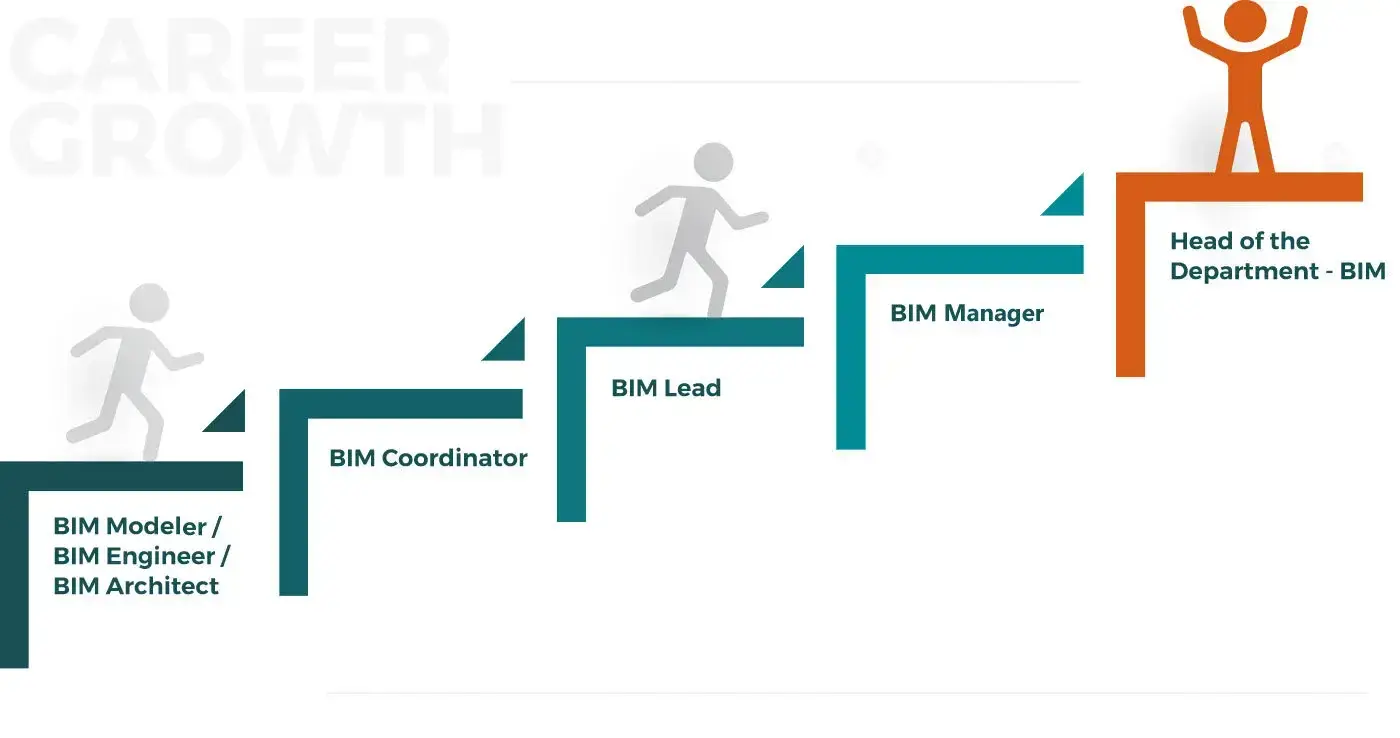.jpg)
In today’s rapidly evolving AEC industry, staying current with digital design methods is no longer a bonus, it is a requirement. A BIM certification equips professionals with practical knowledge and tools that align with how the industry actually works. From architects to engineers, those trained in Building Information Modelling are better prepared to manage complex projects, improve collaboration, and deliver efficient results.
For anyone exploring growth in the construction industry, it is natural to ask, is BIM a good career? With companies actively seeking skilled individuals who understand modern workflows, the answer is becoming increasingly clear. A recognised certification can make all the difference, not just in landing interviews, but in building a long-term, future-ready career.
Rising Demand for BIM-Certified Professionals
India’s construction sector is undergoing a significant transformation, with digital technologies like Building Information Modeling (BIM) at the forefront. As the industry embraces smarter, more efficient building practices, the demand for professionals equipped with BIM skills is on the rise.
According to a report by DDG Global, professionals in India proficient in BIM can earn up to 40% more than their counterparts without such expertise. This premium reflects the value that BIM brings to project efficiency and the scarcity of skilled professionals in this domain.
The Indian government's initiatives, such as the Smart Cities Mission, further highlight the importance of BIM in urban development. These programs aim to integrate digital technologies to improve infrastructure and services, making BIM proficiency increasingly essential for professionals in the AEC sector.
How a BIM Certification Boosts Your Resume?
Employers today value skill over theory, especially in a fast-moving field like architecture, engineering, and construction. A BIM certification proves that you are familiar with tools and understand how to use them effectively in real-world workflows. Here is how it adds weight to your CV.
1. Shows You are Trained for the Industry
A certification course teaches you software and prepares you for actual project conditions. This proves you are ready to contribute from day one, making your profile stronger in a competitive hiring pool.
2. Reflects Your Commitment to Growth
Taking the time to earn a certification shows initiative. It tells employers that you are serious about your development and open to learning new ways of working, a trait every team needs.
3. Makes You Discoverable by Recruiters
Certified professionals are easier to shortlist. When firms search for candidates with BIM career opportunities, a recognised certification increases your visibility and sets you apart from others.
4. Builds Confidence in Your Skillset
Completing a course with hands-on training builds trust, not only in yourself but also in the eyes of hiring managers. It shows you have already solved design problems, not just studied them.
5. Unlocks Access to Multiple Roles
Many job listings now ask for specific BIM experience. One of the key BIM certification benefits is that it qualifies you for roles that are unavailable to those without formal training.
Why do Employers Trust Certified Professionals More?
In the AEC industry, practical skills often outweigh general experience, especially when it comes to BIM. That is why employers actively seek candidates who hold recognised certifications. Here are some factors stating why the leading AEC companies pick certified professionals.
- Bring verified expertise aligned with industry standards and project needs.
- Certified talent reduces the risk of errors in complex BIM workflows.
- Structured learning ensures, you have mastered key concepts, not just surface-level knowledge.
- Trained to use the latest tools, improving overall team efficiency.
- Certified candidates often require less onboarding time, saving both time and cost.
Higher Salary Potential & Career Growth for BIM-Certified Professionals
In India's rapidly evolving construction sector, professionals equipped with BIM skills are witnessing significant BIM salary growth and enhanced career prospects. As the industry increasingly adopts digital methodologies, the demand for certified BIM professionals is on the rise. According to Glassdoor, a BIM Specialist earns an average salary range of INR 5 to 10 LPA.
A BIM certification not only enhances earning potential but also opens doors to leadership roles and specialised positions. Employers value certified professionals for their verified expertise, leading to faster promotions and greater responsibilities.
Global Career Opportunities with a BIM Certification
A BIM certification course opens doors to multiple job roles across international markets. As more countries adopt digital construction practices, skilled professionals are finding exciting BIM career opportunities worldwide.
- BIM Job Roles in india: The demand for BIM talent is on the rise, with the Indian BIM market expected to grow at a CAGR of 11.5% by 2033 (IMARC Group ). The demand is rising for roles like BIM Manager, Revit Specialist, and BIM Lead, especially in metro cities where infrastructure and smart city projects are booming.
- BIM Job Roles in the USA: BIM professionals in the US can explore high-paying roles such as VDC Engineer, BIM Consultant, and Digital Construction Lead. These roles are common across large architecture and general contracting firms. Salaries are among the highest in the industry, especially for those with hands-on project experience.
- BIM Job Roles in the Middle East: BIM is central to ongoing megaprojects across the UAE and Saudi Arabia. Roles like 4D BIM Planner, BIM Manager, and Clash Detection Specialist are in demand for high-budget developments. Students or professionals who have certifications are valued more for leadership positions.
- BIM Job Roles in Europe: Countries like the UK, Germany, and the Netherlands are seeing increased BIM career path adoption especially for BIM workflows. Roles such as BIM Coordinator, Information Manager, and Design Technology Specialist are growing across public and private sectors.

BIM Certification vs. Self-Learning
Here is a simple comparison table for BIM Certification vs. Self-Learning.
|
Aspect |
BIM Certification Course |
Self-Learning |
|
Learning Structure |
Well-organised with step-by-step modules |
Unstructured; you decide what to learn and when |
|
Guidance & Mentorship |
Access to experts and industry professionals for support |
No formal support; dependent on forums and online content |
|
Curriculum Quality |
Designed by professionals to match industry needs |
Varies depending on free or paid resources |
|
Tools & Software Training |
Hands-on practice with latest BIM software |
May lack practical exposure or official software access |
|
Job Readiness |
Includes portfolio-building, mock interviews, and placement support |
Depends on your own networking and experience building |
|
Credibility |
Offers a recognised certificate for BIM careers |
No formal proof of learning, less impact on CV |
|
Time Efficiency |
Faster learning with clear timelines |
Can take longer with trial-and-error approach |
|
Cost |
Paid investment for structured growth |
Mostly free, but may lack depth and quality |
How to Choose the Right BIM Certification Course?
Selecting the right BIM course can make a big difference to your future in the AEC industry. Here are some factors that you should consider while choosing a BIM certification course.
1. Industry Recognition and Accreditation
Not all BIM certifications carry the same weight. Choose a course offered by an organisation that is recognised in the AEC industry. Courses backed by industry professionals or endorsed by global firms are more likely to give your CV an edge. A well-recognised certificate adds credibility and shows employers that you have met certain professional standards, making you more appealing for roles across architecture, construction, and engineering.
2. Comprehensive and Practical Curriculum
A strong curriculum goes beyond theory, it focuses on real-world application. Look for a course that includes hands-on training, project-based learning, and workflows that mirror actual industry practices. It should cover the essentials of BIM software like Revit, Navisworks, or ArchiCAD, and offer insight into how different disciplines collaborate through BIM. Make sure the syllabus is up-to-date and designed with input from professionals currently working in the field.
3. Career Support
Career outcomes matter. A course that offers guidance beyond just training, like help with portfolios, interview prep, and BIM job placement, can significantly increase your chances of landing a role. Some programme offer mentorship, mock interviews, or direct connections with hiring firms. If your goal is to work in a competitive market, this kind of support is essential for breaking in and moving up in your career.
4. Learning Flexibility
BIM training takes time and effort, so it is important that the course fits into your daily routine. Online courses with flexible schedules allow you to learn at your own pace, especially if you are working or studying full-time. However, flexibility should not compromise the learning quality. Make sure the course includes interactive sessions, live guidance, and accessible resources, so you stay engaged and supported throughout.
5. Real-World Projects and Portfolio Development
Employers often look at what you can do, not just what you know. A course that includes live projects or simulation-based learning helps you build a strong portfolio. This is especially important in BIM careers, where collaboration, problem-solving, and tool mastery are key. A well-built portfolio with BIM models, coordination work, and detailed documentation can make you stand out from other applicants.

Why Novatr’s BIM Certification is the Best Choice?
Novatr’s BIM course is tailored for architects who want to stay relevant in today’s fast-changing design world. It does not just teach theory, you will actually apply what you learn through practical tasks, team projects, and expert guidance. Everything is structured to help you build real confidence, not just tick boxes.
- Learn directly from global industry experts with real-world project experience
- Hands-on training in leading 12+ BIM software used across the AEC industry
- Work on live, multidisciplinary projects that mirror real industry workflows
- Access to a global community of architects, engineers, and design professionals
- Personalised career support including portfolio building and interview prep
- Dedicated BIM job placement assistance to help you secure roles in top firms
Conclusion
Stepping into the world of BIM career opens up a future-proof path for those with a background in architecture or engineering. If you are wondering where to begin, Novatr offers one of the most comprehensive BIM Courses for Architects and Civil Engineers in India to help you build real-world skills. Their immersive curriculum, expert mentors, and hands-on approach make it the ideal BIM course in India for serious learners looking to stay ahead in the industry.
Now’s the time to take control of your career journey. For more insights, checkout Novatr’s Resource Page!
Was this content helpful to you
.jpg)
TABLE OF CONTENTS







